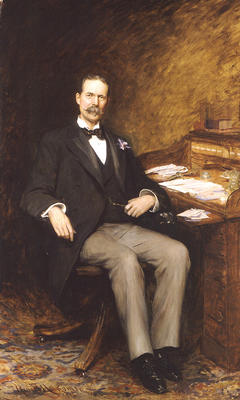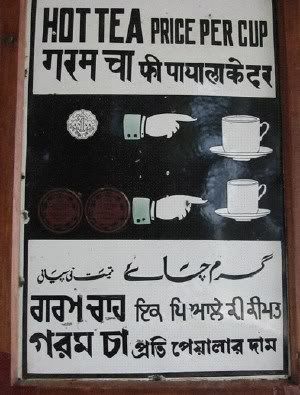Chai cha-he-aye
By Owais Mughal
I am sitting in front of my computer, listening to my favorite “Vital Signs” song:
“Ye shaam phir nahi aaye gi”
(This evening won’t come again)
I am smiling and sipping on my favorite Lipton Tea, while my fingers are keying in this moment in time.
All in all, a very coordinated effort is going on between my mind and soul. But take “Lipton tea” out of this equation and I’ll be left to a bored-to-death person listening to an archaic ancient group which historians remember by the name of ‘Vital Signs’ from early 90s and writing these disjointed words.
Lipton Tea - these two words stir deep memories in me. The earliest memory of Lipton tea in my life is drinking it with my  maternal great grandfather (paR-naana). [This portrait, by the way, is of Sir Thomas J Lipton; not of my paR-naana!).
maternal great grandfather (paR-naana). [This portrait, by the way, is of Sir Thomas J Lipton; not of my paR-naana!).
Grandfather was born in 1890 and lived till 1980. Until his last days he had a habit of making a cup of tea around 3 pm, and whenever I was around (which I always was) he used to pour some tea in my cup too. After that both of us would start watching PTV which started its daily transmission around 4 p.m. and sip on our tea.
My grandfather had migrated to Pakistan in 1947 from New Delhi. He used to tell me all these great political stories from the old days, the Caliphate Movement, First World War, Quit-India Movement, Second World War, the Pakistan movement and finally the emergence of Pakistan. He always believed that Jinnah was the greatest leader ever. No wonder that such dedication and faith on Jinnah from common people of India brought reality to the dream of Pakistan.
He told me that until 1900s not many people in India knew about drinking tea (except for the tea growing areas of Darjeeling/Assam etc). British and whatever was left of East India Company at that time owned all the tea plantations in India, Ceylon (SriLanka), and Africa. Raw tea leaves were sent to London at Lipton Tea Company  and after being processed and packed, was brought back to India and sold at exorbitant prices to the local people, on whose land the tea grew in first place.
and after being processed and packed, was brought back to India and sold at exorbitant prices to the local people, on whose land the tea grew in first place.
Grand father told me that in the early 1900s Britishers used to set tea-stalls at street corners all over India and used to offer ‘free’ tea cups to Indians to promote the Lipton brand. In the beginning tea drinking was fashion at the high echelons of Indian society. Nawabs, and Rajas used to drink it in parties but within years its use grew all around and it even reached the far-flung villages of India. The accompanying picture is a tablet that was placed at Bahawalnagar railway station in early 20th century. It is now placed in Pakistan Railway’s Heritage Museum at Golra Sharif near Islamabad. It advertises hot tea in Devnagri, Gormukhi, and Urdu scripts.
He also told me that drinking tea at 3:00 p.m. sharp was a British tradition brought to India too. British used to drink tea two times a day en-mass. First time was at 3:00 p.m. (called ‘low tea’) and then again at 6:00 p.m. (called ‘high tea’). Low tea and high tea were the names given to this tea drinking habit just like breakfast-lunch-dinner.
The invention of the habit of afternoon tea is credited to Anna, Duchess of Bedford, who in about 1840 began taking tea with sandwiches and cakes to ward off “that sinking feeling” around four o’clock in the afternoon. Since the upper classes ate dinner fashionably late, Anna and her friends found that tea and small cakes were perfect to tide them over between lunch and dinner. Her idea soon became the fashion, and an English institution was born called ‘low tea’.
I guess grandfather and I kept the tradition alive in Karachi till 1980 :)
Last time I was in Karachi I saw tea stalls and tea-shops at almost every street corner. It  looks like the whole population now craves tea. And it is a part of our daily life. I won’t say its addiction, but would rather recite the famous sher by plagiarizing it a bit:
looks like the whole population now craves tea. And it is a part of our daily life. I won’t say its addiction, but would rather recite the famous sher by plagiarizing it a bit:
Chai se gharz-e-Nishat hai kis roo-siaah ko
Ik gona-e-bay-khudi mujhay har dum chahiyay
(Who the cursed-face needs pleasure out of tea
All I need is a place of solitude.)
Tea is also an essential part of Urdu literature. Shafiq-ur-Rehman who along with Mushtaq Yousufi is perhaps the greatest humor writer of Urdu invented the term chuhaas which rhymes with pyaas(thirst) and means a thirst of tea.
Owais Mughal grew up in Karachi and is an Electrical Engineer now living in St. Louis, Missouri.

 Governmetn websites:
Governmetn websites:









 Election Commission
of
Pakistan
Election Commission
of
Pakistan 







 English Newspapers
English Newspapers
















 Dars-e-Quraan
Dars-e-Quraan Dr. Israr Ahmad
Dr. Israr Ahmad 
0 comments:
Post a Comment